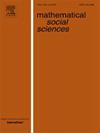Strategic behavior in contests with sabotage
IF 0.7
4区 经济学
Q4 ECONOMICS
引用次数: 0
Abstract
Sabotage is incorporated into Dixit (1987)’s classic model of a two-player probabilistic symmetric contest to show that in contrast to his result and apart from a special case, a player will, if possible, commit to a level of effort different from that in Nash equilibrium. This implies that the subgame perfect equilibrium of the sequential contest differs from the Nash equilibrium of the corresponding simultaneous contest and that a player prefers to be the first mover in the former type of contest rather than participating in the latter type.
与蓄意破坏竞争中的战略行为
破坏被纳入到Dixit(1987)的经典的二人概率对称竞争模型中,以表明与他的结果相反,除了特殊情况外,如果可能的话,参与者将投入与纳什均衡不同的努力水平。这意味着顺序竞争的子博弈完美均衡不同于相应的同步竞争的纳什均衡,玩家更愿意在前一种竞争中成为先发者,而不是参与后一种竞争。
本文章由计算机程序翻译,如有差异,请以英文原文为准。
求助全文
约1分钟内获得全文
求助全文
来源期刊

Mathematical Social Sciences
数学-数学跨学科应用
CiteScore
1.30
自引率
0.00%
发文量
55
审稿时长
59 days
期刊介绍:
The international, interdisciplinary journal Mathematical Social Sciences publishes original research articles, survey papers, short notes and book reviews. The journal emphasizes the unity of mathematical modelling in economics, psychology, political sciences, sociology and other social sciences.
Topics of particular interest include the fundamental aspects of choice, information, and preferences (decision science) and of interaction (game theory and economic theory), the measurement of utility, welfare and inequality, the formal theories of justice and implementation, voting rules, cooperative games, fair division, cost allocation, bargaining, matching, social networks, and evolutionary and other dynamics models.
Papers published by the journal are mathematically rigorous but no bounds, from above or from below, limits their technical level. All mathematical techniques may be used. The articles should be self-contained and readable by social scientists trained in mathematics.
 求助内容:
求助内容: 应助结果提醒方式:
应助结果提醒方式:


